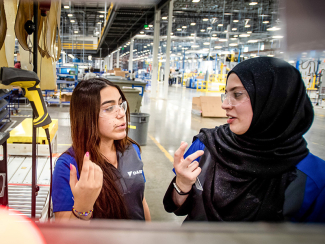
Nature of the Work
Industrial engineers determine the most effective ways for an organization to use the basic factors of production — people, machines, materials, information, and energy — to make or process a product or produce a service. They are the bridge between management goals and operational performance. They are more concerned with increasing productivity through the management of people, methods of business organization, and technology than are engineers in other specialties, who generally work more with products or processes.
To solve organizational, production, and related problems most efficiently, industrial engineers
- study the product and its requirements
- use mathematical methods to meet product requirements
- design manufacturing and information systems
- develop management control systems for financial planning and cost analysis
- design production planning and control systems to coordinate activities and control product quality
- design or improve systems for the physical distribution of goods and services
- determine which plant location has the best combination of raw materials availability, transportation, and costs
- develop wage and salary administration systems and job evaluation programs
Many industrial engineers move into management positions because the work is closely related.
Careers and Internships
Industrial engineers held about 336,600 jobs with the median salary of $101,140 in 2024 in the U.S.. Because their skills can be used in almost any type of organization, industrial engineers are more widely distributed among manufacturing industries than other engineers. These skills can be readily applied outside manufacturing as well. Some work in engineering and management services, utilities, and business services; others work for government agencies or as independent consultants.
Employment of industrial engineers is expected to grow faster than the average for all occupations in the next ten years, making for favorable opportunities. Industrial growth, more complex business operations, and the greater use of automation in factories and in offices underlie the projected employment growth. Because the main function of an industrial engineer is to make a higher quality product as efficiently as possible, their services should be in demand in the manufacturing sector as firms seek to reduce costs and increase productivity through scientific management and safety engineering. Most job openings, however, will result from the need to replace industrial engineers who transfer to other occupations or leave the labor force.
Examples of industrial engineering projects include:
- Making wait times shorter for rides at Walt Disney World to increase guest satisfaction
- Optimizing the nursing staff levels at a hospital to improve patient care
- Streamlining the manufacturing processes of automobiles to make cars more affordable
- Simplifying a supply chain for UPS so deliveries can be made more expediently
- Leading a team of engineers to design new equipment for NASA
- Improving the quality of your favorite candy bar at Hershey’s to increase customer satisfaction
- Performing energy audits to enable more companies to go green
- Consulting and training people to use the latest technology to improve operations
- Designing safer and more ergonomic ways to work on the factory floor at a manufacturing plant
Want to find out more about IISE?
If you want to find out more about industrial and systems engineering, you are encouraged to visit the Institute of Industrial & Systems Engineers (IISE) website.